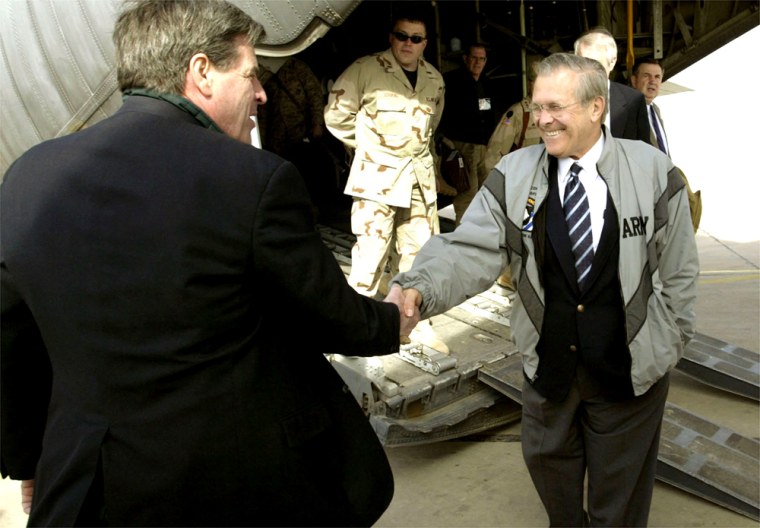The chief threat to stability in Iraq is evolving away from pro-Saddam guerillas to suicide bombers and other terrorists, U.S. military officers told Defense Secretary Donald Rumsfeld on Monday.
Rumsfeld, on a daylong trip to the occupied Iraqi capital, was briefed on the threat and the status of new Iraqi security forces, which the U.S. hopes will eventually take the lead in combating it. For now, though, they work largely under the leadership of the better-equipped and trained U.S. forces.
Speaking to reporters in Baghdad, Rumsfeld said Syria and Iran both continue to allow anti-U.S. fighters across their borders and into Iraq. “We are not getting good cooperation with Iran and Syria,” Rumsfeld said.
It is not the first time that Rumsfeld has accused the two countries of actions that harm U.S. interests in Iraq, although other U.S. officials have said there is little sign of active Syrian or Iranian meddling in the country.
On the issue of who is launching attacks inside Iraq, U.S. officials in Iraq told Rumsfeld the origin of these terrorists remains murky — in particular the extent of their relationship with al-Qaida. Some are thought to be from the homegrown Ansar al-Islam group; others are thought to be former supporters of ousted President Saddam Hussein who have joined Islamic extremist groups, and others might be from al-Qaida itself.
“We’ve seen a real step up on the part of these professional terrorists from al-Qaida and Ansar al-Islam conducting suicide attacks,” Ambassador Paul Bremer, chief of the Coalition Provisional Authority, told reporters after meeting with Rumsfeld Monday.
The best evidence of terrorist ties is in the nature of the attacks — some of which rely on suicide bombers — and the tactics and weapons used, said Brig. Gen. Mark Kimmitt, the deputy operations director for coalition forces in Iraq.
Fewer attacks?
The tactics are similar to those used by al-Qaida and related organizations, Kimmitt said. Only one al-Qaida figure has been captured in Iraq, and another senior terrorist— Abu Musab Zarqawi — is described by U.S. officials alternately as a freelancer with al-Qaida ties to a senior associate of Osama bin Laden. He remains at large.
Meanwhile, attacks on coalition forces have dropped from 50 per day in November to between 15 and 20 a day, Kimmitt said. And gun battles with guerrillas have been supplanted by remotely detonated bombs and suicide bombers.
The targets have also changed. Around 8:45 a.m. local time Monday morning, an unidentified bomber detonated a white Oldsmobile outside a police station in Kirkuk in northern Iraq, Kimmitt said. At least 10 people were killed and dozens others injured.
Iraqi police were investigating. It was unclear if the driver of the car was inside when it exploded, Kimmitt said.
U.S. officials say their adversaries are targeting American forces less, instead targeting police and civil defense stations and trying to foment interethnic and religious violence. Such are the goals laid out in an intercepted letter that U.S. officials believe was written by Zarqawi.
Kimmitt and other officials attributed the drop in guerrilla-style attacks to the December capture of Saddam. Documents found with him provided information on the guerrilla organization and financing, and his detention probably served to persuade some Iraqis to stop supporting the resistance.
Meeting trainees
In addition to meeting with senior U.S. military and occupation officials Monday, Rumsfeld also visited elements of Iraq’s security apparatus. He saw trainees with the new Iraqi Civil Defense Corps taking a first aid class, and also spoke of the importance of transferring security duties to Iraqis.
“We’re looking forward to seeing Iraqis take over responsibility for the security of your country,” he told a a small group of young Iraqis in uniform.
Kimmitt said the new security agencies, financed by $3.2 billion from the last Iraqi funding bill approved in Congress, do not have the training or equipment to handle many security threats. But U.S. authorities are trying to get them patrolling the streets as much as possible.
Still, U.S. forces expect to remain in Iraq for well after the June 30 transfer of authority to a new Iraqi government from the occupation authority, Bremer said.
U.S. officials, citing polls, said while a majority of Iraqis want the occupation to end, they don’t want to U.S. forces to quit the country while security threats remain.
Rumsfeld arrived Monday morning from Kuwait and took a helicopter ride to the headquarters of the 2nd Armored Cavalry Regiment east of here. It was his fourth trip to the region since the U.S.-led coalition ousted Saddam from power last spring.
